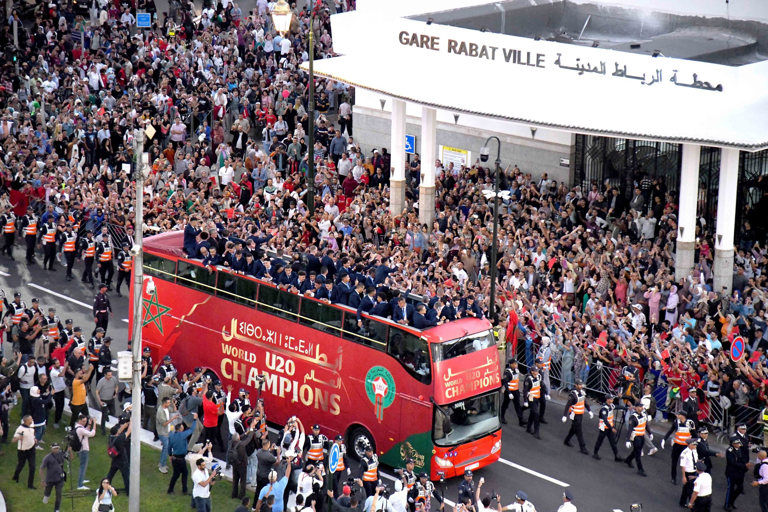Analysis | Sports and Politics: Morocco’s Historic U-20 World Cup Triumph
- Oct 24, 2025
- 4 min read


By: Widyane Hamdach, Ph.D.
New York: Sport, particularly football (soccer), serves as a powerful medium for political expression. The recent victory of Morocco's U-20 national football team in the 2025 FIFA U-20 World Cup highlights this, igniting national pride and unity in Morocco and across Arab and African communities. Morocco's 2-0 win over Argentina marks a historic achievement, making it the first Arab nation and the second African country, after Ghana in 2009, to claim the victory. This success sparked celebrations in many cities, where citizens proudly displayed their national colors, showcasing their collective pride and unity. This unity showcases how sport can strengthen national identity and foster belonging among citizens.
The Moroccan Football Federation celebrated the victory as a source of national pride and a symbol of hope for Arab sport, highlighting its significance in a broader context. King Mohammed VI has emphasized the importance of football in promoting unity and pride, exemplified by the Mohammed VI Football Academy established in 2009 to nurture young talent and instill discipline. This initiative has enhanced Morocco's reputation as a progressive nation, reflected in the national team's historic performances driven by a long-term vision. Fouzi Lekjaa, head of Morocco’s football federation, credited King Mohammed VI’s plan to enhance football for the U20 World Cup win. He congratulated the Moroccan people and dedicated the trophy to the King, calling him the nation’s top sportsman.
Political Expression and Social Change
The timing of Morocco's World Cup victory coincided with widespread protests organized by groups like Gen Z 212 demanding reforms in education, healthcare, and employment. The government's response to these protests was notably swift. King Mohammed VI addressed the nation, acknowledging the need for social reforms and directing the government to increase spending on education and healthcare by 16% in the upcoming 2026 budget of $15 billion. The alignment of national pride from Morocco's World Cup victory with citizens' demands for social change highlights sport's influence on political behavior. The team's triumph strengthened the bond between the people and the monarchy and encouraged constructive political engagement.
Morocco’s World Cup-winning soccer team received a warm welcome, celebrating national pride and unity. Crowds in Rabat, Casablanca, and Marrakech waved flags and sang as the royal family greeted the team. Crown Prince Moulay Hassan showcased diplomatic poise and connection with Moroccan youth. His engagement with the players highlighted the blend of tradition and modernity in Morocco’s identity. The prince’s approachable demeanor resonated with young Moroccans, symbolizing hope and continuity. International observers praised his statesmanship, seeing him as the future of Moroccan diplomacy—focused on openness and youth empowerment. The monarchy, by acknowledging the people’s aspirations during a moment of collective pride, effectively used sport as a form of soft power to reinforce social cohesion, rebuild trust in institutions, and channel patriotic energy toward reform rather than dissent. This illustrates how sport, beyond its entertainment value, can operate as a political force—bridging citizens and leaders in moments of shared national triumph.
Regional and International Influence
Morocco’s World Cup victory extended beyond sport, serving as a significant political and diplomatic statement that enhanced the country’s image globally. This triumph became a symbol of unity and resilience, with celebrations spanning from Rabat to Paris and New York. It positioned Morocco as a stable, modern nation, boosting its appeal to tourists and investors, while reinforcing its role as a bridge between Africa, the Arab world, and Europe. Ultimately, this was more than a sporting achievement—it was a diplomatic success that put Morocco on the world map.
On the regional stage, Morocco’s triumph fostered a renewed sense of pan-Arab and pan-African solidarity. Leaders and citizens across the Arab League and African Union praised the win as a shared accomplishment, signaling the unifying potential of sport in a geopolitically fragmented region. This wave of goodwill translated into diplomatic capital for Morocco, amplifying its influence in continental affairs and strengthening its bid to co-host the 2030 FIFA World Cup alongside Spain and Portugal—a testament to its rising stature in global sports governance.
Internationally, the victory underscored the strategic use of sport as an instrument of soft power, enabling Morocco to project an image of peace, stability, and national confidence. As Joseph Nye (2004) explains, soft power relies on attraction rather than coercion, and Morocco’s football success achieved precisely that by capturing hearts and imaginations worldwide.
Thus, Morocco’s historic victory was not simply a sporting event but a political milestone, enhancing the nation’s diplomatic leverage, cultural influence, and global recognition. The monarchy’s active involvement and strategic narrative have transformed this athletic success into soft power, enhancing state legitimacy and fostering civic pride while projecting a positive image internationally.
About the Author
Dr. Widyane Hamdach is a political science professor and UN programs coordinator at Saint Peter’s University. A PhD graduate in Global Affairs from Rutgers University, she combines academic expertise with over 17 years of journalism covering the United Nations and international affairs.
